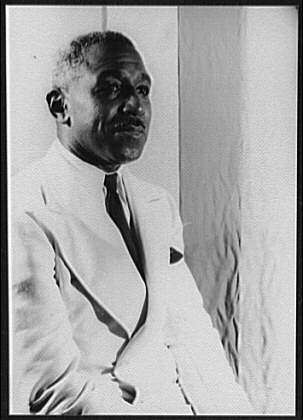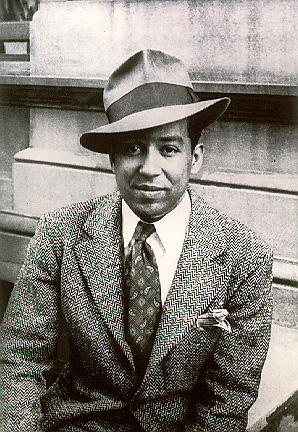George Schuyler’s “The Negro-Art Hokum” and Langston Hughes’ “The Negro Artist and the Racial Mountain” have historically been considered in tandem as one is a direct response to the other. Both were published in The Nation in 1926. In “The Negro-Art Hokum,” Schuyler makes an argument against the specificity of African-American art, thus the title. If something is a “hokum” it is nonsense, or something that is meaningless or untrue. For Schuyler, there is no such thing as African-American art. Because of the influence of white models, and the varied participations of white people, Schuyler claims that what is called African-American art is really just American art.
Langston Hughes wrote “The Negro Artist and the Racial Mountain” one week later in response to Schuyler. In his argument, Hughes criticizes what he calls “the racial mountain,” which he states is “this urge within the race toward whiteness, the desire to pour racial individuality into the mold of American standardization, and to be as little Negro and as much American as possible.” He stresses his belief in the particular experiences of African-Americans to create cultural arts that are distinct, and are beautiful and important in that distinction.
Consider these two arguments from the early part of the twentieth century in relation to the arguments Morrison makes toward the end of the twentieth century in “Unspeakable Things Unspoken.”

George Schuyler

Langston Hughes

Schuyler’s article seems to be a response to his hatred for sociology. He compares the middle class and elite African Americans to the middle class and elite white Americans while ignoring the disproportionate numbers within the classes. He seems to only be looking at art that comes from those classes. Does he examine the art that emerged from lower class African Americans? If so, would there be more of the raw African American experience/history present in these works than those of the mid class/elites?
My big question relates to the Hughes article. Why can’t someone just want to be a poet? Why does color have to play a role?
As someone who wishes to write and finish a book one day, I don’t want to be considered a “white author” but just simply an author. I’m not trying to reject being white or being clumped in to the white middle class. I just want to be recognized for the quality of my work without someone thinking “that white guy can sure write well”. Is it possible that this poet felt the same way?
first off Schuyler’s article he says that African American art is Hokum. But who is the person or persons that makes that judgement, African American art is something that needs to be accepted the art should not be separated from others because of who made it. Unfortunately that is the very thing that is happening and Hughes shows that in his article. It is not that the art is bad or lesser than white American art it is because America is still unfortunately a white society. And not until then will African American Art be accepted, society has to change to have not just African American art accepted but all things that are made from people that were at one time or another degraded as a lesser person then the typical white person of america. Should a person be called by anything other then their name unless they choose to?
By far the most concise and up to date information I found on this topic. Sure glad that I navigated to your page by accident. I’ll be subscribing to your feed so that I can get the latest updates. Appreciate all the information here
All of this comes down to a matter of choice. I do agree with the comment made regarding one choosing to use one’s identity if that is his or her will. This also applies to groups of people. You are not forced to label yourself as a white author or black author, but in America, we are given a choice. At this time in history the black man definitely was at a huge disadvantage to other races, as the impact of slavery and discriminatory laws hindered him (us). It was with good reason that brothers and sisters created an identity for themselves and their work.
it is important to first understand the era in which both of these essays where written in order to understand the context of each.hughes responds to schuyler in this way because african americans are often disadvantaged and labelled as inferior.he thus wants to prove a point that blacks are good as whites and so believes they should be labelled as black poets so whites can recognise their works too.that is what counts especially in those times.schyler also proves a point that white influence should be taken into consideration because anything black is good as white but fails to admmit that it is vital to african american to stand up for their identity and prove themselves in their works
Pingback: What Statement is the MFAH Making with “Statements”? – Glasstire